|
|
|
Sort Order |
|
|
|
Items / Page
|
|
|
|
|
|
|
| Srl | Item |
| 1 |
ID:
171944
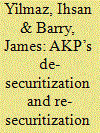

|
|
|
|
|
| Summary/Abstract |
This article evaluates the Turkish state’s relations with the Alevi community through a securitization theory framework. It first examines the issue in its historical context, comparing Kemalist and more recent policies, and highlights that despite the ideological differences between the previous governments and the current AKP government, for Alevis much has remained the same. It then turns to the securitization of the Alevis by successive regimes, and demonstrates that the period of de-securitization begun under the AKP did not end the practice, and that political expedience led to the issue’s re-securitization.
|
|
|
|
|
|
|
|
|
|
|
|
|
|
|
|
| 2 |
ID:
108462
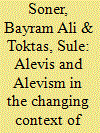

|
|
|
|
|
| Publication |
2011.
|
| Summary/Abstract |
The Justice and Development Party (JDP, Adalet ve Kalk?nma Partisi) has launched a rapprochement policy toward the Alevis. The JDP's Alevi Opening has presented a unique case in Turkey's latest identity politics not only because Alevi claims, for the first time, came to be involved in political processes for official recognition and accommodation, but also because the process was handled by a political party which is regarded to have retained Islamist roots in Sunni interpretation. This article explores the JDP's Alevi Opening process and tries to explain the motivations behind the party's decision to incorporate the Alevi question in its political agenda. What is more, the debate that the opening has caused is also under scrutiny with the positions and arguments held by the actors and the agencies involved in the process, e.g., the Alevis (the secularist and the conservative wings), the General Directorate of Religious Affairs, the National Security Council, the JDP leadership and the Islamist intellectuals.
|
|
|
|
|
|
|
|
|
|
|
|
|
|
|
|
| 3 |
ID:
160435
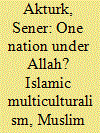

|
|
|
|
|
| Summary/Abstract |
A number of reforms and initiatives, undertaken by the Justice and Development Party (AKP or AK Party) governments in Turkey, widely known as Kurdish and Alevi ‘openings,’ and the less prominent non-Muslim (primarily Armenian and Jewish) openings, have puzzled scholars as to their causes, consequences, and limitations. In this article, I first briefly review four different kinds of analytical accounts that seek to explain the AK Party’s openings. Second, I introduce my argument that an Islamic conceptualization of a new religious-national identity is both the main motivation and the main limitation of these reformist initiatives. Third, I provide an analysis of critical speeches, official statements, and declarations by AK Party leaders, in particular by Recep Tayyip Erdoğan, on the Kurdish, Alevi, and non-Muslim openings, demonstrating that they invoke overwhelmingly religious justifications.
|
|
|
|
|
|
|
|
|
|
|
|
|
|
|
|
| 4 |
ID:
190811
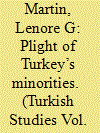

|
|
|
|
|
| Summary/Abstract |
Turkey’s numerous issues with its main minority groups, Kurds, Alevis, Christians, and Jews, continue to disrupt its domestic peace and complicate its foreign relations. In building a nation the founders of the Republic and successive governments have sought to compel minority assimilation with harsh measures such as expulsion, deprivation of property, resettlement, and discrimination, while ignoring anti-minority violence. As a result, most Christians and Jews have emigrated, though Alevis and Kurds more actively continue to demand recognition and equality. To address these issues Turkey might look to other members of the Council of Europe for examples the Republic could adopt to balance minority rights with national loyalty.
|
|
|
|
|
|
|
|
|
|
|
|
|
|
|
|
| 5 |
ID:
152450
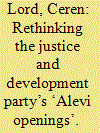

|
|
|
|
|
| Summary/Abstract |
The ‘Alevi openings’ launched in 2007 by the Justice and Development Party have been widely lauded as a historic and unprecedented step in the Turkish Republic. In contrast, this article places the ‘openings’ in a wider historical context, analyzing them in relation to processes of nation-building. Firstly, it is argued that the ‘openings’ marked continuity with previous interventions by state actors, including the military, dating back at least to the 1960s. Secondly, it is contended that these interventions should be regarded as a process of re-framing Alevism within a Turkish–Islamic framework, consigning it to ‘invisibility,’ rather than as democratization.
|
|
|
|
|
|
|
|
|
|
|
|
|
|
|
|
| 6 |
ID:
180534
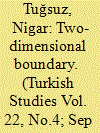

|
|
|
|
|
| Summary/Abstract |
Alevi-Sunni relations in Turkey are the result of a relational process constructed from contributions of each side rather than each groups’ perceptions of the other. Boundaries between Alevis and Sunnis in Turkey have been constructed relationally with the contributions of many complicated socio-political factors. This article aims to answer the question of what the symbolic boundaries between the two groups are, seeking to understand how Sunnis perceive Alevis. This aim will cast light on the nature of the two groups’ relations, help us recognize forms of Alevism and Sunnism specific to Turkey, and advance existing literature on the issue. This paper’s findings are based on ninety semi-structured and two focus group interviews with Sunnis living in Istanbul. Results show that the concept of ‘two-dimensional symbolic boundary,’ which runs along dimensions of not-knowing and not-accepting, is the answer to the question of how Sunnis perceive Alevis. The main components of these dimensions are perceptions, which seem to relate to the interpretations of group norms and values. This study, as a group-based analysis, reveals that perceived group norms – whether religious, cultural, social, or political – determine the perceptions of Sunnis towards Alevis and create dimensions of the boundary between the two groups.
|
|
|
|
|
|
|
|
|
|
|
|
|
|
|
|
| 7 |
ID:
186576
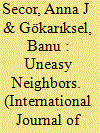

|
|
|
|
|
| Summary/Abstract |
This study takes a critical perspective on the making of sectarian difference and Alevi precarity in contemporary Turkey. Drawing on our research from 2013 to 2016, we present an analysis of stories and conversations that took place amongst Alevi and Sunni focus group participants, primarily in Istanbul. These conversations illustrate how sectarian difference can be made in the relations between neighbors as differences become coded as sectarian and taken up within systems of power and domination. At the same time, our research also shows how, in the entangled relations between neighbors, questions of ethics and mutual responsibility arise, though these relations sometimes become uneasy or even unbearable. Finally, we show how the question of “knowing” difference is taken up within a power-laden discourse of sectarianism, one that is tied to the history of Alevis (and others) in Turkey while also extending well beyond this context.
|
|
|
|
|
|
|
|
|
|
|
|
|
|
|
|
| 8 |
ID:
177269
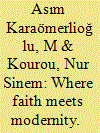

|
|
|
|
|
| Summary/Abstract |
This article intends to shed light on the local politics of the Alevis by focusing on three different cemevis in Istanbul’s Gazi neighborhood. Based on a field study in the neighborhood between 2014 and 2015 and eventually revisiting it in 2019, we analyze the local political dynamics with regard to different cemevis. By so doing, we aim to acknowledge and underline two phenomena: the dialectical tension between faith and modernity as well as the fragmented nature of the Alevi identity. The latter task is crucial since most recent studies concerning Alevis have focused on their so-called ‘awakening’ or the ‘discovery’ of their identity. We look at the other side of the coin as well, namely the fragmentation of Alevi identity that has also been under way in recent decades. By this means, we hope to contribute to the literature on contemporary Alevi identity and politics.
|
|
|
|
|
|
|
|
|
|
|
|
|
|
|
|
| 9 |
ID:
180292
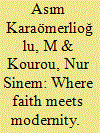

|
|
|
|
|
| Summary/Abstract |
This article intends to shed light on the local politics of the Alevis by focusing on three different cemevis in Istanbul’s Gazi neighborhood. Based on a field study in the neighborhood between 2014 and 2015 and eventually revisiting it in 2019, we analyze the local political dynamics with regard to different cemevis. By so doing, we aim to acknowledge and underline two phenomena: the dialectical tension between faith and modernity as well as the fragmented nature of the Alevi identity. The latter task is crucial since most recent studies concerning Alevis have focused on their so-called ‘awakening’ or the ‘discovery’ of their identity. We look at the other side of the coin as well, namely the fragmentation of Alevi identity that has also been under way in recent decades. By this means, we hope to contribute to the literature on contemporary Alevi identity and politics.
|
|
|
|
|
|
|
|
|
|
|
|
|
|
|
|
|
|
|
|
|